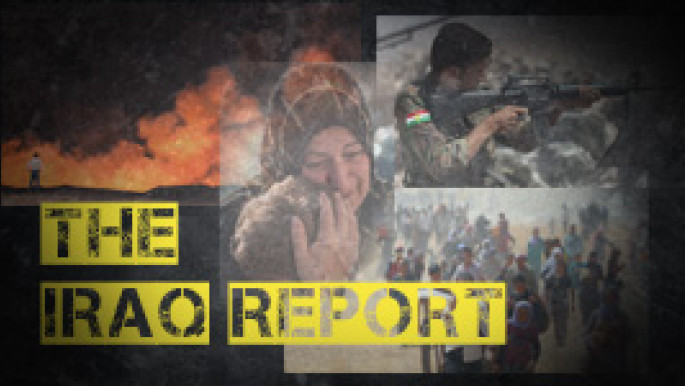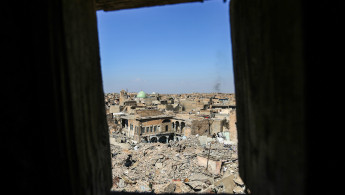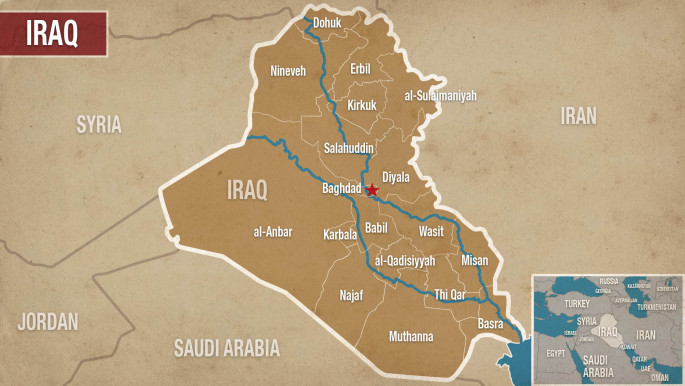Iraqis struggle with social anxiety in Mosul after Islamic State rule
"We lived through terror and now we spend every day trying to help each other cope with the consequences," she tells The New Arab.
Rua has been the team leader at the Nour Health Centre since October 2017. Originally born in Mosul, she remained in her city when the Islamic State group proclaimed their self-styled caliphate, built on fear, in June 2014. The dominion of IS spread across all of the Nineveh region.
Nour Health Centre is in Hayy Nour, a neighbourhood of East Mosul which was liberated only a few months after the start of the US-backed Iraqi military operation to retake the region from IS. The campaign was dubbed "We are coming, Niniveh". Slowly, East Mosul has been returning to some form of normal life.
IS no longer rule, but fear remains
"Many of our patients suffer from social phobias or anxiety," explains Abeer Abdelsittar, a 41-year-old psychologist from the Nour Health Centre. She describes a population struggling to manage symptoms of traumatic stress and agoraphobia - a disorder in which people feel intense fear and panic when in a situation from which they feel they cannot escape or be rescued, even when they are no longer in danger.
"During the battle, they feared for their lives and some of Mosul's citizens hid underground for months," she tells The New Arab.
 |
Now they do not want to go out from their houses, they do not want to answer the phone, they do not want to talk with neighbours and they often wake up in the middle of the night. They do not want to be involved or engaged in anything, especially relationships |  |
"Now they do not want to go out from their houses, they do not want to answer the phone, they do not want to talk with neighbours and they often wake up in the middle of the night. They do not want to be involved or engaged in anything, especially relationships."
Women have been left particularly affected in the aftermatch of the Islamic State group's rule, Abdelsittar adds.
When the extremist group occupied Mosul, women were forced to obey a strict dress code in the streets and could not be outside without a male relative. As a result, many women didn't leave their family home for months.
Abeer Abdelsittar graduated in psychology from the University of Mosul before IS' occupation began but was unable to work for the years they ruled this city. After they were dispersed, she started working at the Health Centre as soon as it was inaugurated.
"During the battle, we were evacuated from the city to Mosul's dam to escape bombings and street battles," Abeer said. Many people experienced trauma during the IS occupation, and the subsequent war, losing homes and loved ones.
Anxiety and trauma affect many of Mosul's citizens who have lost much in the way of material possessions. Homes and businesses have been destroyed, and much of the labyrinthine Old City in West Mosul is now rubble. Residents have been forced to leave; displaced to the city's newer eastern districts.
|
Abeer tells us the story of a 17-year-old who escaped from West Mosul during the battle. He watched his entire family die in front of him, as he fought in vain to save them.
"He is still in shock and alone. He cannot communicate much with people. We are dealing with a lot of these cases and we try to help them through therapy," she explains.
 |
He is still in shock and alone. He cannot communicate much with people. We are dealing with a lot of these cases and we try to help them through therapy |  |
A hierarchy of fear
There are more mental health centres in East Mosul - in al-Qahira, Nabi Yunes and Somar neighbourhoods. Each has a team leader, a case manager, a psychologist, a counsellor, an outreach worker, and a psychiatrist.
The clinics are supported by the Italian NGO Un Ponte Per… ["A bridge to…"] which co-operated with the United Nations Population Fund [UNFPA] to offer mental health and psychosocial support, especially to women and girls who suffered gender-based violence during the three years of the Islamic State group's vicious rule.
Read also: Islamic State rape survivors in Iraq are like 'living corpses'
The project also aimed to support displaced people who returned home to Mosul after its liberation. But in the clinic in Somar, which is situated within the government-run Primary Health Care Centre, men form the majority of patients.
"We use an evidence-based approach, primarily behavioural psychology. I studied a range of approaches, from [Wilhelm] Maximilian Wundt, to the behaviourism of Watson and the psychoanalysis of Freud," Abeer tells The New Arab.
"We assess people individually to understand their difficulties and develop goals. Then, in the case of social phobia or anxiety, we often start by teaching relaxation techniques and progressive muscle relaxation which people can use as coping strategies as they start to face their fears.
"We have developed a graded hierarchy of fears and we support the patient to expose themselves to their fears, step by step, starting with the easiest and working towards the most challenging."
The majority of patients start to feel better after the first session, just through the feeling that someone is listening and taking care of them, Abeer adds.
If the patient does not get better after a number of sessions, the psychologist at the health centre refers them to the psychiatrist, and discusses their case with the team.
IS families: New victims of fear
 |
|
| The Iraq Report - a weekly feature at The New Arab |
Last December the Iraqi government claimed victory over IS, but the group's presence in areas including Nineveh Plains, Anbar and Salahuddin can still be felt.
Militant attacks continue to rock Iraq on a weekly basis, while security forces arrest suspected IS members every day in Mosul. Those who have been arrested are tried in courts and, if found guilty, sentenced to death or life in prison. This is one reason why people still live in fear - the country is far from stable and violent deaths are still commonplace.
Read also: The Islamic State group is not finished – yet
"We adapt the therapy to meet the needs of the individual, paying attention particularly to their cultural needs," says Abeer.
"We write weekly reports detailing the work that has been carried out, and every month we review how many cases are open and how many have been closed and for what reasons."
All the psychologists working in the city's four health centres are originally from Mosul. They have experienced the same trauma as their patients, which helps them understand their difficulties.
 |
All the psychologists working in the city's four health centres are originally from Mosul. They have experienced the same trauma as their patients, which helps to understand their patients' difficulties |  |
In order to take care of their own needs and prevent burnout, the mental health workers have their own group therapy facilitated by an external supervisor.
Thirty-year-old Zaynab Yaseen works at the clinic in Somar and welcomes patients every day. An informatic engineering graduate from the University of Mosul, Zaynab survived three years under the Islamic State group. She spent weeks in an underground refuge with her family during intense battles, as the city was being devastated by coalition airstrikes.
"But we now have an even a bigger challenge," she confesses. "Families now fear violence from the Iraqi army because some of their relatives were IS militants. They are the new victims of fear."
Read also: Islamic State families struggle with life after the 'caliphate'
Rua Ramadan from the centre in Nour also describes how many women are ashamed to admit that their husbands pledged allegiance to IS. Some of these women believed in the group's ideology, some not.
"Even if they don't tell us explicitly, we understand it well: we know where they live and that they had powers in the different neighbourhoods," she says.
"This is a gender-based issue and we are trying to listen to all these women who could not rebel and are paying the consequences. They are afraid of going out."
Zaynab adds: "We are from Mosul and we want all the citizens to be well again.
"In the end, we are all survivors and we are working with passion. We don't want to feel fear anymore."
Marta Bellingreri is a freelance researcher and writer, with a PhD focused on gender studies in the Middle East.
Follow her on Twitter: @MartaDafne




